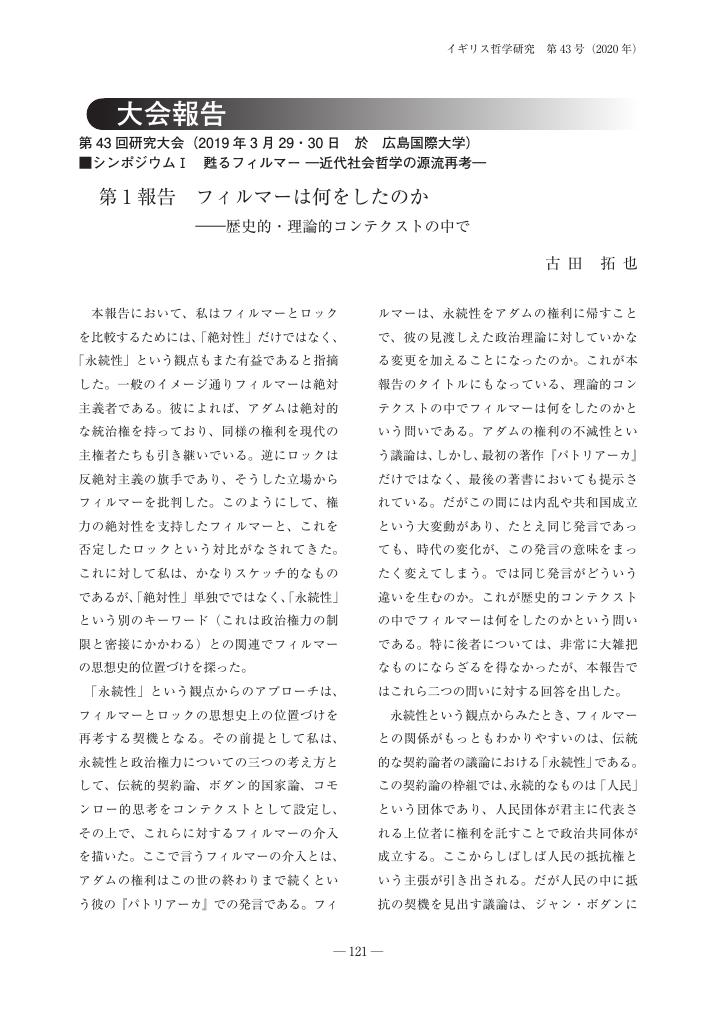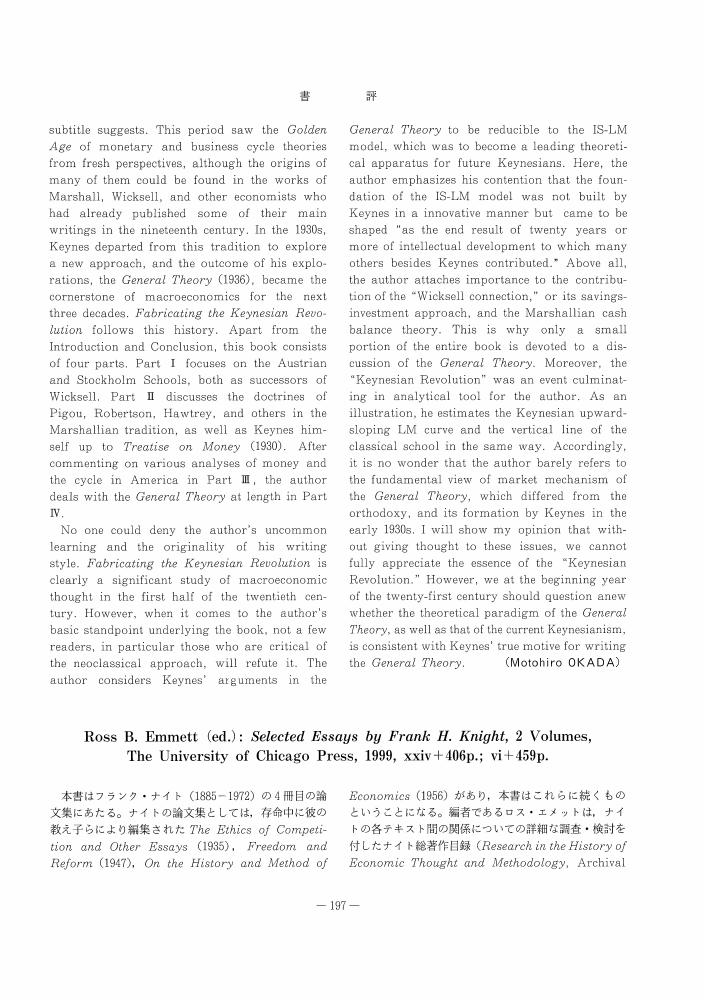218 0 0 0 OA イソバイド服薬改善テストの結果報告
- 著者
- 久保 和彦 佐藤 方宣 小宗 静男
- 出版者
- 耳鼻と臨床会
- 雑誌
- 耳鼻と臨床 (ISSN:04477227)
- 巻号頁・発行日
- vol.59, no.3, pp.122-127, 2013 (Released:2014-06-01)
- 参考文献数
- 12
メニエール病治療薬であるイソソルビドは、苦く特有な味であるために、服用に困難を極める弱点がある。これまで多様な方法が試みられたが、良好な服用法は確立されていない。その服用感を改善するため、健常人 33 名にイソソルビド+ある種の溶液の組み合わせ ( 1 : 1 混合) を 6 種類試飲してもらい、服用しやすさを 5 段階評価で検討した。原液の味に関しては苦味の評点が高かった。服用感については、原液の平均評点が 3.18 だったのに対し、オレンジジュースは 4.12、リンゴ酢は 3.12、炭酸水は 3.30、コカ・コーラTM は 3.76、ポカリスエットTMは 3.61、緑茶は 2.82 と、オレンジジュース、コカ・コーラTM、ポカリスエットTMは有意に服用しやすさを改善したが、緑茶は逆の傾向が見られた。患者がイソソルビドの服用しにくさを訴えた場合は、オレンジジュースかコカ・コーラTM、ポカリスエットTMで倍量希釈することで服薬コンプライアンスを上げられる。
1 0 0 0 OA 利己心の系譜学
- 著者
- 太子堂 正称 井上 義朗 間宮 陽介 桑田 学 原谷 直樹 野原 慎司 高橋 泰城 板井 広明 江頭 進 小沢 佳史 佐藤 方宣 笠井 高人 高橋 聡 村井 明彦
- 出版者
- 東洋大学
- 雑誌
- 基盤研究(B)
- 巻号頁・発行日
- 2015-04-01
本研究は、現代の経済理論が前提としている人間像について、その思想的系譜を解明することを目指して行われた。スコットランド啓蒙における「経済学の成立」から現代の行動経済学・神経経済学へと至るまでの野党な経済学者、理論の分析を通じて、効用や利潤の最大化を図る利己的人間観が登場してきた過程だけではなく、それぞれの経済思想家の主張の背後には、利他性や社会性を含む多様な人間像が含まれていたことが明らかとなった。
1 0 0 0 OA 大会報告
1 0 0 0 OA 岩井克人(前田裕之聞き手)『経済学の宇宙』日本経済新聞出版社,2015年,490頁
- 著者
- 佐藤 方宣
- 出版者
- 経済学史学会
- 雑誌
- 経済学史研究 (ISSN:18803164)
- 巻号頁・発行日
- vol.58, no.1, pp.161-162, 2016 (Released:2019-11-29)
- 著者
- 佐藤 方宣
- 出版者
- 経済学史学会
- 雑誌
- 経済学史研究 (ISSN:18803164)
- 巻号頁・発行日
- vol.54, no.1, pp.116-117, 2012 (Released:2019-10-31)
- 著者
- 佐藤 方宣
- 出版者
- The Japanease Society for the History of Economic Thought
- 雑誌
- 経済学史研究 (ISSN:18803164)
- 巻号頁・発行日
- vol.49, no.1, pp.178-179, 2007-06-30 (Released:2010-08-05)
1 0 0 0 OA J. M. クラークの社会経済学のヴィジョン
- 著者
- 佐藤 方宣
- 出版者
- The Japanese Society for the History of Economic Thought
- 雑誌
- 経済学史学会年報 (ISSN:04534786)
- 巻号頁・発行日
- vol.45, no.45, pp.40-54, 2004 (Released:2010-08-05)
- 参考文献数
- 40
In the late 1910s, John Maurice Clark insisted that traditional economics (value economics and price economics) was becoming irrelevant to the problems of “an era of social readjustment, ” advocating the need for another type of economic theory which he called “social economics.” This conception of social economics had a place in the basis of his economic thought, and core ideas of his works in the interwar periods, such as Studies in the Economic of Overhead Cost (1923) or Social Control of Business (1926), were corollaries of the fundamentals of his social economics.In this paper, we scrutinize the original plan of John Maurice Clark's social economics logically and historically, and clarify its nature and relevant historical contexts, especially its relationship with the institutionalism movements and the implication of Clark's discussions with Anderson, Jr. on the meaning of social value in economic theory.First, we consider why Clark advocated that social economics must become a centerpiece of economics. This was derived from his relative view of the nature of economic theory, which, he thought, had to reflect dynamic social and economic changes. This is why price economics which was based on static premises and whose materials were selected with reference to a logical “closed system” were irrelevant to problems in an era of reconstruction after the World War I. He claimed that it must become a subordinate part of economics.Secondly, we examine the framework of Clark's social economics which he described as “non-Euclidean.” Clarifying the premises of traditional economics, he presented relevant premises of social economics, such as a concept of wealth as “inappropriables, ” a need for qualitative standards of economic activity, a universal nature of overhead cost, a problem of mechanization, and so on. He proposed that these aspects of social economics reflected the context of that time, such as an appearance of Big Business Systems, and the experience of the World War I.Finally, we examine the backgrounds of Clark's advocacy of social economics, placing it in the context of the American economic thought of the time. We clarified its connection with the emergence of institutionalism movements led by Hamilton and other young economists, and with the controversy regarding the concept of social value. On the one hand, Hamilton's critical judgment for traditional economics and claim for institutional economics took the same approach as Clark's social economics. Therefore they had become representatives of institutionalists in the interwar period. On the other hand, by examining Clark's discussions with Anderson Jr., we recognize that they shared same context of the discussion of social value, started from John Bates Clark's Philosophy of Wealth (1885). This seems to be one of the main sources of J. M. Clark's emphasis on the need for a social value standard which implied a valuation not based on actual market prices.
1 0 0 0 OA フランク・ナイトと制度主義
- 著者
- 佐藤 方宣
- 出版者
- The Japanese Society for the History of Economic Thought
- 雑誌
- 経済学史学会年報 (ISSN:04534786)
- 巻号頁・発行日
- vol.42, no.42, pp.59-70, 2002 (Released:2010-08-05)
- 参考文献数
- 48
In the “standard” history of economics, Knight was positioned as an “orthodox” economist who contributed to the development of neo-classical economics, and as “an ideological opponent of institutional economics.” Indeed, Knight took a critical attitude to the attack on “Traditional Economics” by American institutional economists, especially in the 1920s. However, in recent years, the “heterodox” elements and affinities with institutionalists of his work have been emphasized by certain studies. Moreover, several times he called himself an “institutionalist.” The question we have to ask is why (and how) Frank Knight, who has institutionalist elements, criticized his contemporary American institutionalists. The purpose of this paper is to answer this question by examining his articles in the context of the American economic thought of his day.Knight agreed with most of his contemporary institutional economists regarding the necessity for a “reconsideration” of Traditional Economics. However, he criticized the institutionalist criticism of Traditional Economics as being “irrelevant, ” because, he said, they didn't understand the significance of deductive theory. Knight recognized the limitations of deductive theory; nevertheless, he emphasized its meaning in economics. Knight although criticized the institutionalists regarding their attempts to make economics more “scientific” like other natural sciences. He argued that this claim stood on the misunderstanding of the difference between natural science and social science. Knight emphasized that social science addresses many elements which are irrelevant in natural science. Knight argued that economics is not only a science but also an art. In addition, he positioned institutional economics positively as a “philosophy of history, ” which treats the long-term changes in the datum of deductive and applied economics as the object of consideration.It is important to note that clarifying such a methodological position as Knight's may help us to understand why his main themes shifted from economics, in the narrow sense, to the historical and philosophical consideration of social economic systems. Since the mid-1930s, this shift has reflected the historical changes of western civilization after the emergence of Fascism and the New Deal, which comprised the long-term changes in the datum of economics. His discreet attitude, which placed both deductive economics and institutional economics in their proper positions, isolated him from both the mainstream institutionalists and the neoclassicists. However, his methodological position itself was consistent throughout his academic life. His economics, in the narrow sense, and the institutional economics defined by Knight, held a common value in his economic thought.
- 著者
- 佐藤 方宣
- 出版者
- The Japanese Society for the History of Economic Thought
- 雑誌
- 経済学史学会年報 (ISSN:04534786)
- 巻号頁・発行日
- vol.39, no.39, pp.197-199, 2001 (Released:2010-08-05)
1 0 0 0 イソバイド服薬改善テストの結果報告
- 著者
- 久保 和彦 佐藤 方宣 小宗 静男
- 出版者
- JIBI TO RINSHO KAI
- 雑誌
- 耳鼻と臨床 (ISSN:04477227)
- 巻号頁・発行日
- vol.59, no.3, pp.122-127, 2013
メニエール病治療薬であるイソソルビドは、苦く特有な味であるために、服用に困難を極める弱点がある。これまで多様な方法が試みられたが、良好な服用法は確立されていない。その服用感を改善するため、健常人 33 名にイソソルビド+ある種の溶液の組み合わせ ( 1 : 1 混合) を 6 種類試飲してもらい、服用しやすさを 5 段階評価で検討した。原液の味に関しては苦味の評点が高かった。服用感については、原液の平均評点が 3.18 だったのに対し、オレンジジュースは 4.12、リンゴ酢は 3.12、炭酸水は 3.30、コカ・コーラ<sup>TM</sup> は 3.76、ポカリスエット<sup>TM</sup>は 3.61、緑茶は 2.82 と、オレンジジュース、コカ・コーラ<sup>TM</sup>、ポカリスエット<sup>TM</sup>は有意に服用しやすさを改善したが、緑茶は逆の傾向が見られた。患者がイソソルビドの服用しにくさを訴えた場合は、オレンジジュースかコカ・コーラ<sup>TM</sup>、ポカリスエット<sup>TM</sup>で倍量希釈することで服薬コンプライアンスを上げられる。




